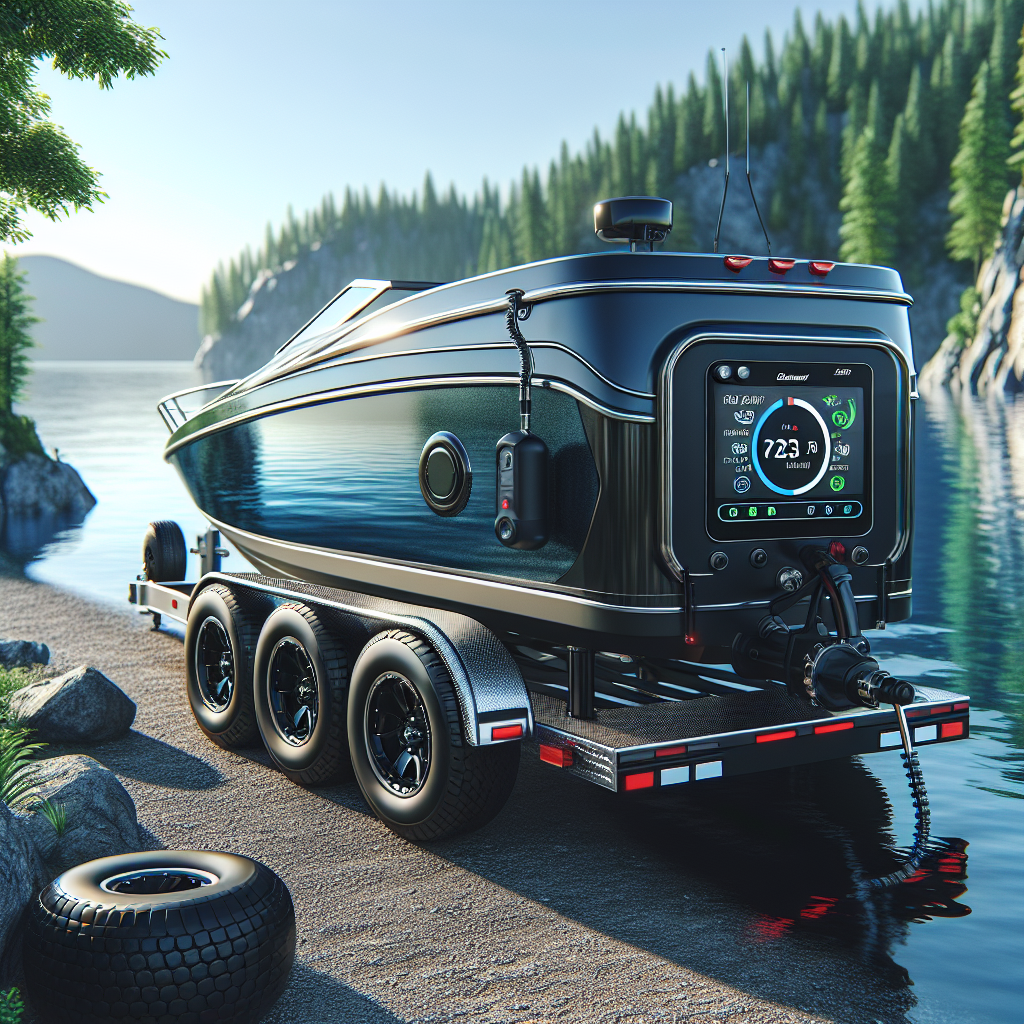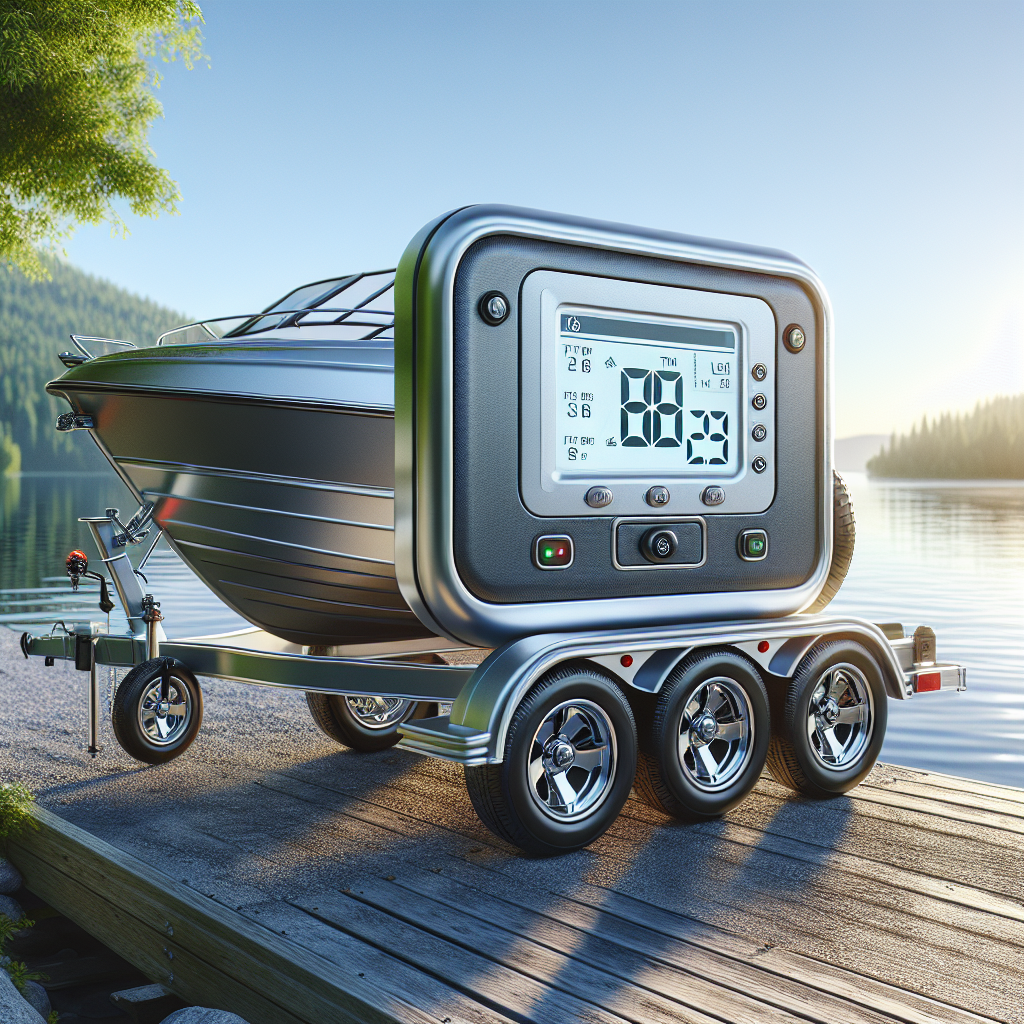In the world of trailer safety, TPMS (Tire Pressure Monitoring System) is an essential component that should not be overlooked, especially for boat trailers. These systems provide real-time data about tire pressure and temperature, which are critical factors in maintaining safety during your travels. Without a proper monitoring system, trailers are at a higher risk of experiencing tire failures, which can lead to catastrophic accidents.
The importance of a TPMS system for boat trailers lies in its ability to detect issues before they escalate. Here are several reasons why investing in a TPMS is crucial:
- Enhanced Safety: By continuously monitoring tire conditions, TPMS helps you avoid blowouts and other tire-related incidents.
- Increased Longevity: Maintaining optimal tire pressure can extend the lifespan of your tires, saving you money in the long run.
- Improved Performance: Properly inflated tires ensure better handling and fuel efficiency, enhancing your overall towing experience.
With the advancement of technology, smart trailers equipped with TPMS can alert you to any anomalies directly to your smartphone. This proactive approach empowers you to take necessary actions before any potential issues arise.
As you prepare for your next adventure on the water, consider how a TPMS can transform your trailer into a smart trailer that prioritizes safety. Tow with peace of mind, knowing that trailerwatchdog is standing guard.
Key Features of TPMS Systems for Boat Trailers

When it comes to selecting a TPMS system for your boat trailer, understanding the key features can help you make an informed decision. These systems are designed to enhance safety and performance, providing valuable insights that traditional monitoring methods simply cannot offer. Here are some of the essential features you should look for:
- Real-Time Monitoring: A quality TPMS provides continuous data on tire pressure and temperature, allowing you to react promptly to any deviations from the norm.
- Alerts and Notifications: Most systems come equipped with alert mechanisms, sending notifications to your smartphone or dedicated device when tire pressure is too low or temperatures are too high.
- Easy Installation: A user-friendly installation process is vital. Many TPMS units can be easily mounted on your existing trailer without the need for professional help.
- Durability: Given the harsh conditions that boat trailers often face, look for TPMS systems that are weather-resistant and designed to withstand the elements.
- Multi-Tire Monitoring: For boats that require multiple axles, a good TPMS will monitor all tires simultaneously, ensuring comprehensive coverage.
- Battery Life: Consider systems with long-lasting battery life to minimize maintenance and ensure uninterrupted monitoring.
By understanding these features, you can choose a TPMS that not only meets your needs but also enhances the safety and reliability of your boat trailer, making your journeys on the water more enjoyable and secure.
How TPMS Systems Prevent Tire Failures

The importance of a TPMS system for your boat trailer lies not just in monitoring, but in its proactive approach to preventing tire failures. Understanding how these systems function can help you appreciate their value in ensuring safe travels.
One of the primary ways TPMS systems prevent tire failures is through early detection. By continuously monitoring tire pressure and temperature, these systems can identify irregularities that may indicate a developing problem, such as:
- Low Tire Pressure: Insufficient air pressure can lead to overheating and blowouts. A TPMS alerts you before the situation becomes critical, allowing you to address the issue promptly.
- Excessive Temperature: Elevated tire temperatures can signal potential problems such as underinflation or overloading. A TPMS can alert you to these hazardous conditions, enabling preventative measures.
- Uneven Pressure Across Tires: Disparities in tire pressure can affect handling and stability. TPMS systems monitor each tire individually, helping to ensure that all tires are functioning optimally.
Moreover, by providing data on tire performance over time, TPMS systems help you make informed decisions about tire maintenance and replacement. Regular insights into tire condition can lead to better scheduling for tire rotations and replacements, preventing unexpected failures.
In essence, a TPMS not only enhances your awareness of tire conditions but also serves as a critical safety tool, significantly reducing the risk of tire-related incidents during your boating adventures.
Choosing the Right TPMS System for Your Boat Trailer

Selecting the appropriate TPMS system for your boat trailer is crucial for ensuring both safety and convenience on the road. With numerous options available on the market, it's essential to consider several key factors to make an informed decision.
Here are some important aspects to evaluate when choosing a TPMS:
- Compatibility: Ensure that the TPMS system is compatible with your specific boat trailer model. Some systems are tailored for particular trailer types, so verifying this compatibility is vital.
- Sensor Type: There are two main types of sensors: direct and indirect. Direct sensors measure tire pressure and temperature directly at the tire, providing real-time data. Indirect sensors rely on the vehicle’s ABS system to gauge tire performance. Direct systems are generally more accurate and preferred for trailers.
- Range and Signal Strength: Assess the range of the TPMS system, especially if you have a larger trailer or a longer towing vehicle. A reliable system should maintain a strong signal even at significant distances.
- Ease of Installation: Look for a TPMS that offers straightforward installation, preferably one that doesn’t require extensive modifications to your trailer. Many systems come with user-friendly instructions that can simplify the process.
- Data Display: Evaluate how the system presents data. Some TPMS units feature easy-to-read displays, while others may rely on smartphone apps for monitoring. Choose a display method that suits your preferences for quick and efficient data access.
Additionally, consider the battery life of the sensors, warranty, and customer support offered by the manufacturer. By taking these factors into account, you can select a TPMS system that best fits your needs and enhances the safety of your boating journeys.
Installation Tips for Your TPMS System
Installing your TPMS system for your boat trailer can seem daunting, but with the right guidance, you can ensure a smooth and effective setup. Here are some essential tips to help you successfully install your TPMS:
- Read the Manual: Before starting the installation, thoroughly review the manufacturer’s manual. It will provide valuable insights into specific requirements, tools needed, and step-by-step instructions tailored to your TPMS model.
- Gather Necessary Tools: Ensure you have all the required tools on hand before you begin. Common tools may include wrenches, screwdrivers, and tire pressure gauges. Having everything ready will make the process more efficient.
- Check Tire Pressure: Before attaching sensors, make sure your tires are inflated to the recommended pressure. This initial check will help you set a baseline for monitoring and avoid inaccurate readings.
- Install Sensors Properly: When installing tire sensors, ensure they are securely attached to the valve stems. Follow the instructions carefully to avoid damaging the sensors or the valve. Proper installation is key to accurate monitoring.
- Test the System: After installation, conduct a thorough test of the TPMS. Check the readings for each tire and ensure that the data is transmitting correctly to the display or app. This step is crucial to confirm that the system is functioning as intended.
- Monitor Regularly: Once installed, make it a habit to regularly check the TPMS readings. Routine monitoring will help you identify any irregularities and address potential issues before they escalate into serious problems.
By following these installation tips, you can ensure that your TPMS system is set up correctly and ready to keep you informed about your trailer’s tire health during every journey.
Maintaining Your TPMS System for Optimal Performance

To ensure your TPMS system for your boat trailer continues to perform optimally, regular maintenance is essential. Just like any other vehicle component, a TPMS requires attention to maintain its accuracy and reliability. Here are some key maintenance tips:
- Regular Sensor Checks: Periodically inspect the tire sensors for any signs of damage or corrosion. Ensure they are securely fastened to the valve stems and are free from dirt or debris that might interfere with their functionality.
- Battery Monitoring: Most TPMS sensors are battery-operated. Check the battery life regularly and replace them as needed to avoid unexpected failures. Keeping an eye on the battery status will help you maintain consistent monitoring.
- Calibration: After changing tires or sensors, it’s crucial to recalibrate your TPMS. This ensures that the system accurately reflects the new tire pressures and sizes, allowing for precise data reporting.
- Software Updates: If your TPMS is equipped with an app or software, ensure it is always updated to the latest version. Manufacturers often release updates that can improve performance and fix bugs.
- Professional Inspections: Consider scheduling regular professional inspections of your TPMS as part of your trailer maintenance routine. A technician can identify issues that may not be visible during a routine check and ensure the system is operating correctly.
By staying proactive with your TPMS maintenance, you can enhance its performance and longevity, ensuring you receive accurate tire data whenever you hit the road or water. Tow with peace of mind, knowing that trailerwatchdog is standing guard.








